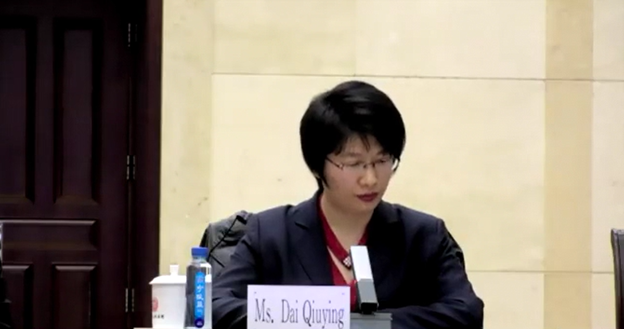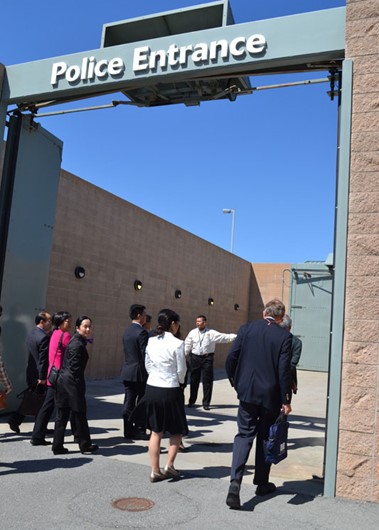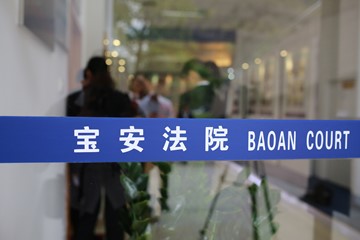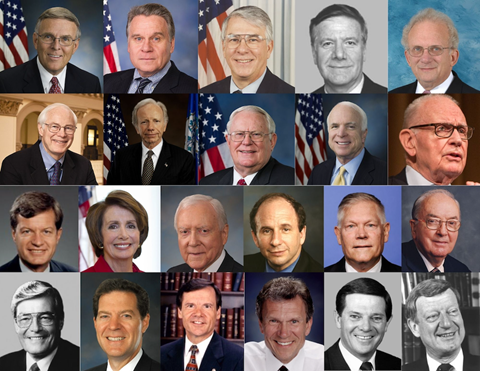EVENTS
Girls’ Symposium Draws to a Close

After six months of groundbreaking exchange, Dui Hua’s International Symposium on Girls in Conflict with the Law ended on March 30 with a bang. The final webinar, in which Dui Hua Executive Director John Kamm moderated a discussion with representatives of China’s Supreme People’s Court (SPC), encapsulated the mission of the Symposium: bringing together experts in criminal justice from around the world to share approaches, challenges, and best practices when it comes to girls and gender-aware treatment within the justice system.
The final webinar was titled “Special and Priority Protection of the Legitimate Rights and Interests of Underage Girls in Accordance with the Law.” It featured two speakers from China’s highest court: Dr. Jiang Jihai (江继海), Director of Juvenile Offender Office of Research Office of SPC (中国最高人民法院少年审判指导工作处处长), and Ms. Dai Qiuying (代秋影), Director of Center for the Protection of Minors of Applied Law Research Institute (中国最高人民法院中国应用法学研究所刑事行政审判研究部主任, 副研究员). This webinar was the culmination of the support and dedicated funding of the Canadian Fund for Local Initiatives, the Ministry of Foreign Affairs of the Netherlands, Mark Headley and Christina Pehl, and the Alice Lam Memorial Fund. It was also supported by core grants from the Swedish International Development Cooperation Agency, the Ministry of Foreign Affairs of Denmark, and the Ministry of Foreign Affairs of Norway.
According to Dr. Jiang, the SPC recorded 2,473 offending girls in 2020—girls who had been convicted and/or sentenced nationwide. This reflects 7.32 percent of juvenile offenders in China. The percentage of girl juvenile offenders has fluctuated, from 6.37 percent in 2018 and 7.72 percent in 2019, but the general trend has been a steady increase in the number of convicted girls (in 2016, 1,570 girls were convicted, accounting for 4.39 percent of juvenile offenders). The numbers cited by Dr. Jiang are some of the most specific figures available on juvenile offenders in the PRC.
Dr. Jiang stated that the most common charges brought against girls are mostly crimes against property and include “fraud, robbery, picking quarrel and provoking trouble, and theft.”
Reflecting on Dr. Jiang’s remarks after the webinar, Executive Director John Kamm noted that “picking quarrels and provoking troubles” is a charge often brought against dissidents and activists—raising the intriguing possibility that some girls might have been convicted of speech and association offenses.

Ms. Dai Qiuying spoke on the use of alternatives to incarceration, stating:
“We consider the possibility of the recidivism of a minor offender, their motive, and we also put into place the criminal policy of rehabilitation through education. This will give them diminished or an attenuated course of punishment on the basis of the proper application of laws in our conviction and sentencing.”

Factors that Contribute to Girls Coming into Conflict with the Law
Occurring over a span of six months, the Symposium was comprised of 12 webinars with a total of 167 attendees. Panelists included researchers, policy makers, and advocates from around the world. Through this series of expert exchanges, the Symposium explored the causal factors and system failures that lead to girls coming into conflict with the law.
Panelists in all regions spoke about common societal and cultural considerations including economic hardship, neglect or abuse at home, mental health issues, and lack of educational opportunities. During January’s panel, titled “Juvenile Incarceration: Alternatives,” San Francisco Superior Court Judge Susan Breall contextualized the dire situation many girls find themselves in prior to coming into conflict with the law:
“Most girls who are arrested are arrested for non‑violent, non‑serious crimes, but they have been victimized in very serious and violent ways before they ever come into the juvenile justice system or the dependency system.”

When girls enter the criminal justice system, these vulnerabilities follow. Panelists raised the issues of discrimination, sexual violence, and lack of appropriate services for juvenile girl offenders, especially in communities of color and indigenous communities. These factors leave girls in custody vulnerable to exploitation and further harm while being held.
Solutions & Best Practices
When speaking about effective strategies for preventing girls from coming into contact with the justice system, panelists emphasized the value of social services, importance of strong family and community relationships, and usefulness of practical vocational training.
Panelists recommended implementing alternatives to incarceration whenever possible. During the webinar “Working with Justice-Involved Girls,” Dr. Michele Burman, Professor of Criminology in the Scottish Centre for Crime and Justice Research at the University of Glasgow, stated the situation plainly:
“Many young people involved in offending behavior could and should be diverted from statutory measures, prosecution and custody through early intervention and the use of robust community alternatives.”

These alternative programs may provide skills training, mental health support, and substance abuse treatment. When detention is unavoidable, it is vital that gender-sensitive responses are taken into account.
GirlsJustice.org
Although Dui Hua worked through considerable obstacles to adapt the Symposium to the online format, this necessary change resulted in a catalogue of online resources that will outlast any in-person conference. GirlsJustice.org is home to over 12 hours of expert exchange produced through the Symposium, as well as transcripts and supporting materials. If you’re curious to learn more, you can reach out to our panelists with questions through the “Start a Conversation” button on their respective index pages. You can also view a list of recommendations with best practices for supporting girls both in- and outside the criminal justice system.
To dive even deeper, download the Global Bibliography of Girls in Conflict with the Law, which Dui Hua compiled for the Symposium. This bibliography includes annotations for resources across the general subject of girls in conflict with the law, including pathways to offending, family and relationships, substance abuse, violence and abuse, commercial sexual exploitation (CSE) and prostitution, mental health, peer groups and gangs, arrest to sentencing, detention and incarceration, post-release, alternative approaches to juvenile justice, and researching and working with girls in conflict with the law.
March and April 2021 have been busy months for Dui Hua. In April, not long after concluding its Symposium, Dui Hua celebrated its 22nd anniversary. Along with the Symposium webinars, Executive Director John Kamm has spoken at four external events. During these exchanges, Kamm engaged the community and explored Dui Hua’s advocacy work from many angles, looking at the current political climate, and the relationship between business and human rights.
On April 8, Kamm spoke to San Francisco University Club members about President Biden’s posture towards China and the difficult situation he has inherited. In a wide-ranging Q&A, Kamm touched on everything from the future of Hong Kong to the question of the US ambassador’s role in easing tensions between the US and China. You can watch the event here.
In late March, Dui Hua took part in two unique outreach events centered around religion, hosted by Trinity-by-the-Cove Episcopal Church and the US-China Catholic Association. You can watch John Kamm’s remarks to Trinity-by-the-Cove here.
On March 24, Kamm addressed members of the Young Presidents Organization (YPO), briefing this group of young executives on the ways business strategies can apply to human right work. He recounted his transition from vice president of a multinational corporation to the founder of a human rights non-profit, and the lessons he learned along the way.
EXCHANGES
Exchanges is a feature that explores Dui Hua’s expert exchanges and dialogues.
“An opportunity for the two countries to engage in a cooperative, non-confrontational way”

With the conclusion of the International Symposium on Girls in Conflict with the Law, Dui Hua has completed its seventh expert exchange. These exchanges support Dui Hua’s human rights advocacy by fostering dialogue about vulnerable prisoners including women in prison and juvenile offenders. As John Kamm said in 2010: “If we can work well together in areas where there is common ground, we might well find that talking with each other on issues where we don’t agree will prove easier and more productive.”
Dui Hua’s work on juvenile justice began in 2008 when it hosted the first-ever delegation from the Supreme People’s Court (SPC) to study juvenile justice in the United States. Six judges from China visited juvenile courts, detention centers, and other facilities in Illinois, Washington, DC, Maryland, and San Francisco, where they met with judges, prosecutors, attorneys, and leading juvenile justice scholars.

More exchanges followed. In 2010, the SPC hosted a US delegation that visited the Beijing Juvenile Reform Center and the Haidian District Court. Both the US delegation and their Chinese hosts conducted mock trials of juvenile cases. In 2012, a Chinese delegation of seven juvenile judges and experts traveled to the Bay Area, where they accompanied probation officers into the field, observed a mock victim-offender mediation, and learned about the Juvenile Collaborative Reentry Team (JCRT). Following the exchange, Kamm said:
“Exchanges between the United States and China in the field of juvenile justice provide an opportunity for the two countries to engage in a cooperative, non-confrontational way in an area of human rights critical to the development of both societies…We are already seeing results from these exchanges.”
In 2014, Dui Hua held two exchanges. The fourth exchange took place in Beijing with a focus on records sealing. The US delegation visited Haidian District Juvenile Court and a seminar in an SPC courtroom attended by more than 40 judges from juvenile courts in 12 Chinese provinces and municipalities. Following this exchange, delegation member and leading expert on juvenile justice Judge Leonard Edwards said:
“The program showed that American and Chinese judges share the same goals. We need to focus on making the juvenile court an effective institution to rehabilitate young lawbreakers. Both countries are committed to making it possible for a juvenile to have a fresh start as an adult and to insure that juvenile arrests do not make it difficult to gain employment or educational opportunities.”

The fifth exchange focused on the treatment of women in prison and the Bangkok Rules, which promote gender-specific measures for women detainees. This exchange brought together 25 expert presenters from nine countries and included a visit to Lo Wu Correctional Institution, a women’s prison in Hong Kong.
The sixth exchange took place in Shenzhen in 2017 and was attended by over 40 Chinese participants, a US delegation consisting of five juvenile judges and experts, and Dui Hua representatives. The US delegation stressed that “children are not simply small adults,” and the Chinese delegation made clear that they too shared this goal of “treating the juvenile offender as a child rather than the child as a criminal.” The delegations visited the Juvenile Delinquent Assist & Education Campus of Baoan District, where social workers demonstrated record sealing protocol, and attended a roundtable discussion hosted by the Shenzhen Intermediate People’s Court.
The International Symposium on Girls in Conflict with the Law was Dui Hua’s seventh exchange overall, the sixth one to focus on juvenile justice, and the second to take a gender-specific approach to the justice systems of China and the United States. Read more about these expert exchanges on Dui Hua’s website.
PUBLICATIONS ROUND UP
Featured: Human Rights Journal, April 8, 2021: The Ongoing Crackdown on Yi Guan Dao

Yi Guan Dao (YGD) has not been rendered extinct in mainland China, despite a lack of recent reporting which has led some experts to express doubt on the sect’s persecution or even existence in the mainland (read “The Resurgence of Yi Guan Dao” for a detailed analysis). Combining elements of Daoism, Buddhism, and folklore, YGD has been banned for over seven decades. During the early years of repression beginning in 1950, scores of YGD members were tortured, imprisoned, and executed.
Dui Hua recently uncovered three court judgments online that corroborate its observation that YGD practitioners continue to be at risk of imprisonment. The sect continues to gain traction among the middle-aged rural population in Shantou, Guangdong, where prosecutors accuse YGD of conducting “reactionary” activities.
See Also: Prisoner Updates 2021 #4
This installment of Prisoner Updates looks at recently uncovered additional information about the “Genuine Communist Party of China 中国真共产党” and its founder Chen Jianmin (陈剑敏) and the ongoing legal limbo of lawyer, activist, and human rights defender Li Yuhan (李昱函).
JOHN KAMM REMEMBERS
John Kamm Remembers is a feature that explores Kamm’s human rights advocacy prior to and since Dui Hua’s establishment in 1999.
Letters from Congress, Part II

Over the next two years, 20 letters were written from Senators and Congresspeople to me, Chinese ambassador Li Daoyu, Chinese President Jiang Zemin, Chinese Premier Li Peng, and Minister of Justice Xiao Yang. I also received a verbal commitment to help from House Speaker Newt Gingrich (R-Georgia) and, after a somewhat contentious session, from Senator Dianne Feinstein (D-California). On a visit to Beijing, Congressman Ed Royce (R-California) – he went on to become Chairman of the House Foreign Affairs Committee – managed to hand one of my lists to a startled Premier Li Peng.
The first letter came from Senator John Kerry. He had visited San Francisco on March 31, 1996, and together we had met with the Chinese consul general. Minister Song Zengshou. One of the topics the senator raised was the violation of American company intellectual property rights (IPR) by Chinese state-owned enterprises. The consul general claimed that the Chinese government was not able to track IPR violations by Chinese firms. Senator Kerry scoffed: “You can track citizens who voice dissenting views, but you can’t track companies that violate IPR?”
In his letter to me on June 11, 1996, Senator Kerry said that the “noteworthy success” of my dialogue with the MOJ “testifies to the wisdom of pursuing engagement with, not containment of, China.” He asked that as soon as I had received responses to my lists, I let him know so that he could invite me to Washington “to brief some of my skeptical colleagues on the value of dialog on human rights with the Chinese government.” He dangled the possibility of my testifying to the Senate Foreign Relations Committee on the results of my work in China.
Two days after the Senator Kerry letter, Senator Craig Thomas (R-Wyoming), chairman of the Senate Foreign Relations Committee’s Asian and Pacific Affairs Subcommittee, sent a letter to Chinese ambassador Li Daoyu. He told Ambassador Li that he thought my cooperation with the MOJ was significant and valuable and urged him to contact MOJ minister Xiao Yang and SCIO deputy director Ma Yuzhen to resume the Prisoner Information Project. Like Senator Kerry, he said it would be desirable for me to come to Washington to brief colleagues.
Two months went by. The letters from Senators Kerry and Thomas failed to get the desired results, so I turned to Congressman Chris Smith (D-New Jersey), chairman of the House of Representatives Subcommittee on Human Rights and a strong critic of China’s human rights record. I had met Congressman Smith at my first testimony on MFN in May 1990, and he and I had become friends (we both grew up on the New Jersey shore, so we were both “clam diggers”). In his letter, addressed to me and dated September 17, 1996, he made the point that for dialogue to be effective, “the question of trustworthiness is critical.” He too invited me to come to Washington to share with colleagues whatever information on prisoners I obtained “as we continue to assess US-China relations.”
The three letters appear to have had an impact. On October 15, 1996, the Director of the MOJ’s Prison Administration Bureau, sent me a letter stating that “the Chinese side does not have the duty to provide the American side with the information on the seventy-five inmates you mentioned.” I immediately replied, saying that I agreed that the Chinese government is not obligated to provide information about its prisoners to foreign governments, but stressing that this was a situation involving a private individual to whom the Chinese government had made a promise. My letter went unanswered. After waiting a few months, I resumed pressing members of Congress to write letters to the Chinese government.
On February 5, 1997, Congressman Lee Hamilton, Ranking Democratic member of the House International Relations Committee, wrote to Chinese Ambassador Li Daoyu expressing support for my work and asking him to urge the MOJ to provide the information that had been promised to me two years before. In quick succession, letters were sent by Congressman Matt Salmon (R-Arizona), who had studied Mandarin as a Mormon missionary in Taiwan, to Ambassador Li Daoyu (March 10, 1997) urging China to honor its commitment to me; Congressman Ed Royce (R-California) to Chinese premier Li Peng (March 21, 1997) pointing out the importance of honoring commitments; and Senators Max Baucus (D-Montana) to Ambassador Li (April 14, 1997), Paul Wellstone (D-Minnesota), and Congressman Doug Bereuter (R-Nebraska) to Ambassador Li, all urging the Chinese government to renew cooperation.
In June 1997, President Bill Clinton gave me the first Global Practices Award for my work on behalf of lesser-known political prisoners in China.
In August 1997, National Security Advisor Sandy Berger traveled to Beijing for discussions with Chinese President Jiang Zemin about a possible state visit to the United States in October 1997. After Berger’s return to the United States, the Department of State announced that President Bill Clinton would host Jiang on a nine-day visit in late October. A summit between the two leaders would take place on October 29, 1997.

Prior to Jiang’s arrival in the United States, I sent the MOJ two new lists: one a “national list” with 37 names from provinces all of China, and one a list of 24 counterrevolutionaries and hooligans in Shandong Province, where leaders of the June 1989 protests had received some of the longest prison sentences in China. Also prior to the October summit Senator Hatch (R-Utah) visited China and intervened on my behalf with President Jiang Zemin and Minister of Justice Xiao Yang, urging them, in private meetings, to resume providing the information promised to me.
Talks between the two governments began on a list of “deliverables,” things that the two countries wanted to see come out of the Clinton-Jiang summit. One of the American deliverables was the resumption of my “prisoner information project.” A joint statement issued at the end of the summit affirmed both sides’ commitment to holding human rights dialogues involving both governmental and non-governmental organizations. A side document referenced resumption of the prisoner information project. (Mine was the only name in the joint statement documents. Mention of my name in Chinese, Kang Yuan, prompted hilarity on the Chinese side: Kang Yuan is a homonym of the name of a popular biscuit in China).

Unfortunately, information did not begin to flow, necessitating another barrage of letters from members of Congress including Congressman Don Manzullo (R-Illinois) to Jiang Zemin (Manzullo attached one of my lists of religious prisoners to his letter), Senator Orrin Hatch (expressing disappointment that the promised information had yet to be provided), and Senator Jesse Helms, perhaps the fiercest critic of “Red China” in the Senate.
All the while I was getting lawmakers to write letters, senior administration officials including Secretary of State Madeline Albright and National Security Advisors Tony Lake and Sandy Berger were raising the Chinese side’s failure to honor their commitments with senior Chinese officials, including Foreign Minister Tang Jiaxuan, even after President Jiang’s promise that it would do so. The American embassy in Beijing also weighed in, pressing the Ministry of Justice to resume providing information. President Clinton exchanged letters with Senator Hatch in which the president expressed strong support for my efforts. I was authorized to provide the letters to the Chinese government.
In February 1998 I traveled to Atlanta to attend a conference with former President Jimmy Carter. On February 13, I received a phone call from Bai Ping, Deputy Director Bai Ping of the MOJ’s Foreign Affairs Bureau, advising me that I would be sent information on prisoners “in a few days.” As promised, I received the information – a partial installment on the list of 100 – a week later. I advised Senator Hatch, who commended me on this achievement, and other members of the House of Representatives and Senate who had supported me.
By the time Dui Hua was established in April 1999, the MOJ had fulfilled its 1995 commitment to provide information on 100 prisoners, “to the best of its ability.” The last installment was provided June 22, 1998, the eve of President Clinton’s state visit to China. Bolstering my claim, made in Congressional testimony in September 2006, that asking about prisoners tripled the chance of clemency, a majority of prisoners on my 1995, 1996, and 1997 lists had been granted early release from prison, while others had benefited from better treatment.

After the resumption of the prisoner information project, members of Congress and the Clinton and George W. Bush administrations continued to write letters to Chinese officials supporting my efforts to win the release of counterrevolutionaries and reduce use of the death penalty. Some letters asked for my help in assisting constituent’s family members incarcerated in China. Some letters, including one sent to Religious Affairs Bureau chief Ye Xiaowen by Congressman Joe Pitts, were sent with prisoner lists.
In all, 60 letters were written from 1996 to 2007. Letters were written by members of the Senate and House of Representatives including House Minority Leader Nancy Pelosi (D-California), House Majority Whip Tom Delay, Chairman of the Senate Finance Committee William Roth (R-Delaware), Senate Minority Leader Tom Daschle (D-South Dakota), Senator John McCain (R-Arizona), Senator Joe Leiberman (D-Connecticut), Senator Sam Brownback (R-Kansas), Senator Tim Hutchinson (R-Arkansas), Pete Sessions (R-Texas), Phil Crane (R-Illinois), Howard Berman (D-California), and Jim Leach (R-Iowa). The last letter, dated June 5, 2007, was written to me by Senator Byron Dorgan (D-North Dakota) following a discussion we had in Rome.
The experience of having to fight for MFN renewal taught Beijing the importance of Congress in making China policy. After China gained entry to the World Trade Organization in December 2001, it gradually came around to the view that Congress was less and less important in formulating China policy, even though, in 2020, more than 300 bills and resolutions touching on China’s “core interests” in Hong Kong, Tibet, Taiwan, and Xinjiang were debated in Congress, and several were passed by both chambers with veto-proof majorities. Today, letters from congresspeople and senators to the Chinese government are often ignored and almost never acted on. I took advantage of a special moment in the history of US-China relations to use Congress to help political prisoners in China.
